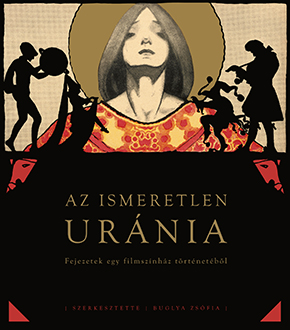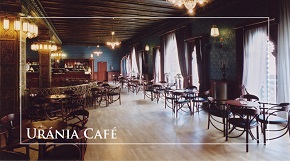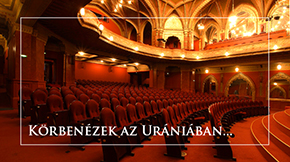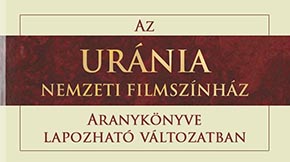
Trans Sibirian Express - Cinema of the Russian Regions, from Kazan to Vladivostok
30 november 2016 - 8 march 2017
With the help of Uránia’s upcoming film series, we will be able to travel through Russia’s lesser known regions and get introduced to the culture, traditions and cinematic achievements of the Tatar, Bashkir, Buryat, Mansi, Khanty, Udmurt, Nenets, and Mari ethnic groups of the Russian Federation.
This collection of contemporary Russian cinema kicks off on November 30th, 2016 and closes on March 8th, 2016 with the screening of Akira Kurosawa’s Academy Award-winning masterpiece Dersu Uzala.
In the last fifteen years, new cinematic hotspots have appeared on Russia’s film industry map. Traditionally, Soviet-Russian cinema has been mainly defined by the works of 3-4 film studios that were based in Moscow and St. Petersburg. Lately, however, the film culture of various republics of the Russian Federation have gained new momentum.
In Tatarstan, 27 independently owned studios were registered with about 80 films produced each year, of which about 3-4 are feature-length fiction. They have not raised a profit yet, but the content of these films have succeeded in raising awareness about region-specific social issues and thus help to confirm the presence of a local film culture.
Similarly, film culture is developing in the Republic of Bashkortostan. In the last couple of years, 4 feature films were produced in the republic’s state studio, as well as about 50 other films were made across different genres. There are also privately owned studios in the republic. A surprisingly large number of films are made in Udmurtia, in the Sakha (Yakutia) Republic, and in the Khanty-Mansi Autonomous Okrug. In the Republic of Buryatia not only independent productions are made, but co-productions with Irkutsk and Mongolian partners also shape the formation of a local film culture. The film industry of this region is also an interesting point of reference in terms of its finance: several studios have succeeded in making a profit with the films produced.
The boom is a result of these ethnic regions striving to strengthen their local identity and culture. While, at the same time, they would also like to become a more integral part of the world’s dominant economic and intellectual forces.
Many films were made in regions where the prevailing ethnic groups are relatives of Hungarians or have somehow shaped the history of Hungary. The cultural interactions are indisputable.
Introducing the development of Russia’s regional film industry enables us to gain a comprehensive and up-to-date image of these minority groups and their culture.
Program
November 30, Wed, 2016
Tatarstan today
5 pm Contemporary Tatar culture and film culture - Panel discussion (Cafe)
Guests: Svetlana Bukhareva, producer of the movie Bibinur; Salavat Yuzeev, director of The Kurban Novel: A Story of Sacrifice; Iván Forgács, film historian, curator of the screening series.
6.30 pm Bibinur
Tatarstan, 2009, 98’, dir: Iurii Feting
8.30 pm The Kurban Novel: A Story of Sacrifice
Tatarstan, 2015, 110’, dir: Salavat Yuzeev![]()
December 14, Wed, 2016
6.30 pm Red Ice
Khanty-Mansiysk, 2010, 97’, dir.: Oleg Fesenko
8.30pm Angels of the Revolution
Yekaterinburg, Khanty, 2014, 113’, dir: Aleksei Fedorchenko![]()
January 11, Wed, 2017
6.30 pm White Moss (White Yagel)
Nenets, 2014, 98’, dir.: Vladimir Tumaev
8.30 pm First Love
Buryatia, 2013, dir. Bair Disenov![]()
January 25, Wed, 2017
6.30 pm Salika
Mari El, Tetarstan, 2010, 100', dir. Vasili Domrachev
8.30 pm Celestial Wives of the Meadow Mari
Russia, Mari, 2012, 106’, dir.: Aleksey Fedorchenko![]()
February 8, Wed, 2017
6.30 pm Berry-Strawberry
Udmurt, 2011, 95’, r: Piotr Palgan![]()
February 22, Wed, 2017
6.30 pm Wind Catcher
Bashkir, 2010, dir. Ajsziuak Jumagulov![]()
March 8, Wed, 2017
7 pm Dersu Uzala
USSR, Japan, 1975, 136’, dir. Akira Kurosawa
The series was supported by the National Cultural Fund of Hungary and could be established with the help of the directors, producers and distributors of the films. Especially, we would like to thank the Ministry of Culture of the Republic of Tatarstan and Mosfilm Cinema Concern for their kind support.
Related shows
Trans Sibirian Express: Bibinur
Trans Sibirian Express: The Kurban Novel: A Story of Sacrifice
Trans Sibirian Express: Red Ice
Trans Sibirian Express: Angels of the Revolution
Trans Sibirian Express: White Moss (White Yagel)
Trans Sibirian Express: First Love
Trans Sibirian Express - Salika
Trans Sibirian Express - Celestial Wives of the Meadow Mari
Trans Sibirian Express - Berry-Strawberry
Trans Sibirian Express - Wind Catcher
Trans Sibirian Express - Dersu Uzala
| Mo | Tu | We | Th | Fr | Sa | Su |
|---|---|---|---|---|---|---|
| 30 | 1 | 2 | 3 | 4 | 5 | 6 |
| 7 | 8 | 9 | 10 | 11 | 12 | 13 |
| 14 | 15 | 16 | 17 | 18 | 19 | 20 |
| 21 | 22 | 23 | 24 | 25 | 26 | 27 |
| 28 | 29 | 30 | 31 | 1 | 2 | 3 |
![]()
07.21 - 07.25
2025.10.18 19:00 - 22:30
2025.10.26 18:00 - 21:30
2025.11.08 19:00 - 22:30
2025.11.16 18:00 - 21:30
2025.11.22 19:00 - 23:15
2025.12.07 18:00 - 22:15
2025.12.13 19:00 - 22:15
2025.12.21 18:00 - 21:15
2025.12.26 11:00 - 13:00

Opening hours: Summer opening hours from June 26 to August 28, 2025! During this period, the box office opens on weekdays at 4:30 PM, on weekends at 10:30 AM.
Box office closes 15 minutes after the start of the last screening.
The Uránia Café is open during the opening hours of the cinema.
© Uránia Nemzeti Filmszínház
1088 Budapest, Rákóczi út 21.
getting here
ticket info
contact us
company details
press
privacy policy








